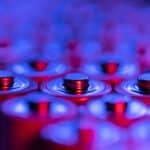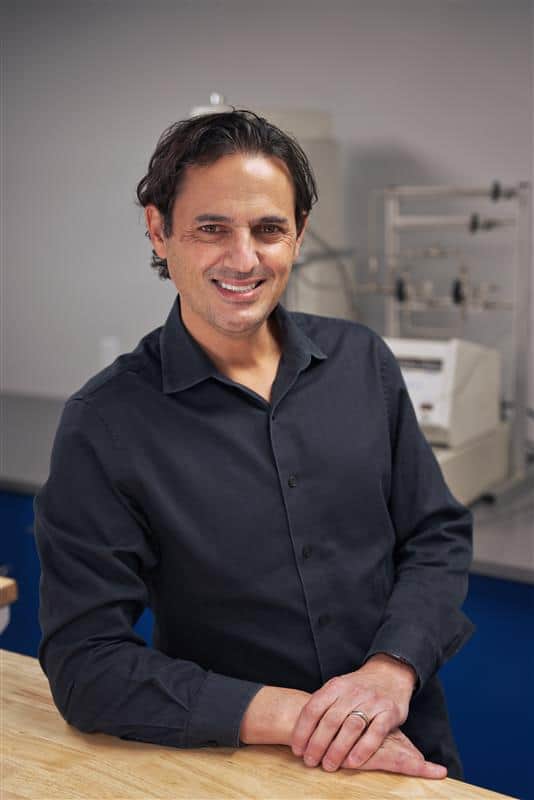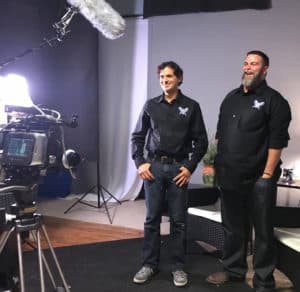
MENUMENU
TALK TO AN EXPERT
Special Hours: 7AM – 6PM PST
TALK TO AN EXPERT
Special Hours: 7AM – 6PM PST
At Dragonfly Energy, our company is filled with people who come from diverse backgrounds, from former bike mechanics to med school graduates: our company is our people. Our CEO, Denis Phares, traveled a long road before starting Dragonfly Energy. We wanted to share the story that would eventually lead to the creation of the best lithium-ion battery company in the industry.

As a first-generation Lebanese American, Denis lived all over the country: he grew up in Philly, studied environmental engineering at Caltech, sang the blues in Texas bars, and sampled air pollution in Atlanta, before starting a company here in Reno, Nevada.
From an early age, Denis was guided by his thirst for knowledge, a love of music, and a drive to make the world more sustainable. He doesn’t know when he first became concerned with climate change. It didn’t seem to worry any of his family or friends. But as a teenager in the ‘80s, he remembers reading about climate change, and the hole in the ozone layer, and they struck him as issues that will impact humanity in his lifetime.
“I was just like ‘this is kind of important, and we need to start talking about this now,’” Denis said. “It seemed like a no-brainer to me, but there was no solution in sight.”
As he got older, Denis dedicated himself to studying physics and environmental engineering to understand the problem. He knew humanity needed to reduce carbon emissions, but it wasn’t feasible to return to a pre-industrialized society. We need technology to provide a way for everyday people to produce less carbon while maintaining modern living standards.
This concern would lead Denis to create Dragonfly Energy.
Denis’s parents came to America from Lebanon in the early ‘70s, so his father could get his doctorate in physics at Harvard. Denis was born in Cambridge, MA, in 1972. His family moved back to Lebanon in 1973, but shortly after Denis’s little brother was born, the Lebanese Civil War broke out in 1975. The family came back to America to flee the fighting and eventually settled in Philadelphia.
As a young child, Denis struggled with the trauma of being uprooted to a different country with a foreign language. He was quiet but eventually found his voice through his passion for music, especially rock ‘n’ roll. So, he learned to play the guitar.
“I remember listening to the Beatles for hours and being mesmerized,” Denis said. “I would lay on my bed and listen to AC/DC, Foreigner, and Lynyrd Skynyrd on cassette tapes.”
As a teenager, Denis dreamed of becoming a musician, but he also loved studying math, physics, and biology. Though he made it onto the varsity tennis and squash teams, he felt a little out of place in school. He graduated high school early at 16 and went to Villanova University.
At first, Denis thought he would major in both physics and biology. But he would soon find himself staying up all night reading physics textbooks. He became fascinated by the giants of modern physics like Niels Bohr, Albert Einstein, and Louis de Broglie, and began to study the lives of these prolific thinkers too.
“I learned about all these physicists that were doing this stuff that was so beyond what had been done for centuries in terms of thought.” Denis said.
He would also read biographies of his favorite musicians, including Eric Clapton, Jimmy Page, and Jimi Hendrix. Denis was inspired by these iconoclasts. Groundbreaking physicists like Einstein and revolutionary guitarists like Hendrix both represented a spirit of innovation to him.
Starting college at 16 and looking even younger, Denis didn’t have a typical undergraduate experience. He worked hard, hanging out in the physics department in the day and spending his nights studying and playing guitar in his room. At 19, he got his bachelor’s degree in physics.
After graduating from Villanova, Denis decided to attend Caltech. He was lured by California’s balmy weather and Caltech’s impressive number of Nobel Laureates. Though he found theoretical physics fascinating, he wanted to apply what he was learning to make the world more sustainable. So, he joined the environmental engineering department, famous for studying water quality and air pollution.
Now that he was older, Denis had an easier time fitting in with a college crowd. Still dreaming of being a musician, he played lead guitar in many bands and played shows in Los Angeles, Orange County, and Hollywood. His favorite gig was playing to a packed house in Silver Lake with Yoko Ono and John Lennon’s son, Sean, in the crowd.
“Caltech was so much fun for me, I played a lot of music there, and I was also a founding member of the Caltech Rugby Club,” Denis said. “I played just as much as I worked, so it was a good time for me.”
Though he was tempted to drop out of school to pursue his music career, Denis was still hard at work getting his doctorate. He eventually met his future wife at Caltech, which helped him reevaluate his chances at making a living in L.A.’s late ‘90s music scene.
Denis wanted to focus on the environment, and he ended up in the aerosol group of his doctoral program, which mainly studies air pollution. However, he ended up doing his thesis on the adhesion of microparticles to surfaces. The Federal Aviation Administration sponsored his project to help airport security detect plastic explosives from luggage, which was a hot topic in the ‘90s. He even appeared on the show 20/20 when they interviewed his advisor about the project.
Though the project wasn’t focused on climate change, Denis is still proud of the critical research he did at Caltech. His thesis titled “Particle Resuspension from Surfaces” earned him his Ph.D. at 26.
After getting his doctorate, Denis and his (then) girlfriend moved to Delaware so he could complete a postdoctoral fellowship at the University of Delaware, where he was able to study pollution and climate change again.
“It was a very fruitful time for me, and I worked my ass off,” Denis said. “I did a lot of research and wrote lots of papers during graduate school and during my postdoc, and eventually I got a faculty position.”
He learned how to design and build practical instruments such as a mass spectrometer, which he used to study air pollution in big cities. He made the spectrometer, put it in a trailer, and drove it to Atlanta and Houston to study air quality in two separate field campaigns.
“It was eye-opening in terms of the crap that you breathe when you’re in the city, especially if you live in the bad part of town,” Denis said.
By this time, Denis had a solid academic background, and he took a tenure-track faculty position at Texas A&M. He taught classes in fluid mechanics, heat transfer, thermodynamics and developed his own curriculum in air pollution and aerosol mechanics.
Denis said being a professor wasn’t easy, but he enjoyed teaching because it allowed him to master the subjects he taught. He also liked working with curious, hard-working students. Though he loved teaching, he disliked grading, and at 27, he felt a little too close in age to his students.
Denis continued to explore playing music, as he played blues and rock ‘n’ roll at bars in the heart of Texas and made a lot of friends with self-described rednecks outside his normal life in academia. He didn’t party with his students, but sometimes they would recognize him from the shows he played.
Being a professor gave Denis lots of intellectual freedom, allowing him to expand his research and learn new things. He learned about molecular dynamics modeling, direct numerical simulations of fluids, and how to collaborate with other professors.
“One thing a Ph.D. teaches you is how to learn,” Denis said. “As a professor, you unleash yourself to learn all kinds of stuff because you have the freedom to study whatever you want.”
“I remember sitting down and being like ‘Ok, I have never done a molecular simulation: I’m going to read a bunch of papers, I’m going to open up my computer, write a code and try it.’ That’s how it would start, and I have a paper in that now.”
Denis loved writing papers and getting his thoughts out there, but he chaffed against the academic gamesmanship of getting your papers cited by others and the politics of bringing in research dollars. He was also frustrated because he felt his most innovative papers were ignored, while his less groundbreaking work attracted attention.
“That is where I started to think, ‘Maybe I’m different than other professors, there is something I’m not getting, something I’m not clicking with,’” Denis said.
Though Denis was enjoying Texas, he had the opportunity to move back to Southern California, and work as a Senior R&D Engineer for a company called Glaukos, a startup biotech firm in Laguna Hills that creates stents to treat people with glaucoma. He was a scientist by day and a guitarist in Hollywood at night.
“I would have to get back to Orange County for my job, drink some coffee, wipe off my eyeliner and go to work,” Denis said.
Denis would soon return to academia, and he became an associate professor in aerospace and mechanical engineering at the University of Southern California (USC), working towards his tenure. He built more elaborate mass spectrometers and studied fuel cells, solar cells, lithium-ion batteries, and other devices.
Denis said he felt like he was all over the map, but he still enjoyed learning about so many different topics. Yet, he was more focused on scientific innovation than activities that advanced his career: squeezing out the most papers possible from a single topic or maximizing research dollars for the university.
At USC, he also learned about the patent process, what it meant to develop intellectual property (IP), and the basics of how companies form from technological innovation.
In the end, Denis got tenured, but he found it unsatisfying. He observed technology firms who would come to USC, license a patent, and then attempt to start a business around that IP. But Denis didn’t think that was an effective approach to commercializing technology. There was a clear difference between trying to squeeze a buck out of a patent and trying to change the world.
That is when Denis started thinking about starting his own company. Though he believes education is critical for society, he began to believe he could make a significantly bigger impact by starting his own company.

But starting in 2008, life became hectic for Denis and his wife. The recession hit, raising the cost of living as the housing crash tanked the value of their home. With two young children at home, he was also running his businesses while still working as a professor. Denis didn’t even have time for his own band, though he continued to perform now and then as a hired gun.
Unfortunately, like many startups, his companies struggled to get off the ground. But he did get a crash course in how to start a company and caught the entrepreneurial bug.
“I wanted to make an impact, I wanted to build a company that is sustainable,” Denis said. “I know investors always need to know ‘How do you exit, is someone going to buy it, are you going to IPO?’ And it’s like ‘Well, there is no obvious exit strategy, we’re just trying to build something that will make a difference.’”
Making LiFePO4 powder got him interested in lithium-ion battery technology, and he began to focus on how to improve the manufacturing process for lithium-ion battery cells. He drew on all of his life experiences to create Dragonfly Energy.
“I basically applied what I had learned from particles sticking to surfaces, like when I was doing my explosives stuff,” Denis said. “I had taken what I had learned as a scientist at Glaukos, and all the background I had in fluid and aerosol mechanics at Texas A&M and USC, and I focused it all on this problem.”
Denis said he remembers how excited he was for this new idea as he wrote it all down in his notebook. Denis had lots of experience writing proposals for government funding, so he started applying for government grants.
“I wrote proposals to the NSF (National Science Foundation) and the DOE (Department of Energy) and ARPA-E (Advanced Research Projects Agency-Energy) and all the relevant government agencies, and it got rejected every time,” Denis said. “That’s how I knew it was special.”
From his time writing academic papers, Denis learned that sometimes the best ideas don’t get the most attention.
After Denis’s wife got her medical degree, the couple began looking to move to a part of the country with a better cost of living and a more business-friendly environment for a startup.
That is when they became interested in moving to Reno. Housing was affordable, Northern Nevada has a lot of renewable solar and wind power, and the state is one of the few places in the world where lithium is actively mined. Denis thought Reno had a lot of potential to become an energy hub. After moving to Reno, Denis started in the executive MBA program at the University of Nevada, Reno, and rented a small space to hone his process for manufacturing lithium batteries.
Denis met Sean Nichols, as they helped tutor each other throughout the MBA program. Sean helped Denis with social media and marketing courses, and Denis tutored Sean with accounting and finance. They got along right off the bat, thanks to a shared passion for the energy storage industry, and Sean struck Denis as a true businessman. Denis invited Sean to join his new startup, Dragonfly Energy, as you can read about here.
Shop Best Sellers








Ask a technical specialist now at 855.292.2831
Stay in the Know